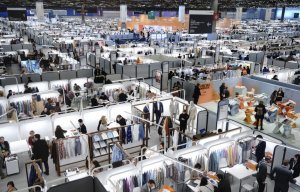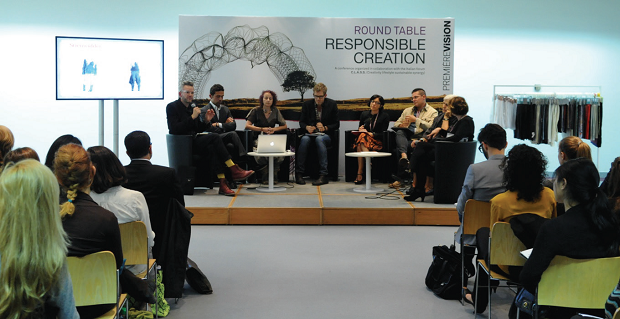
The Good News from Premiere Vision
The topic of responsible textile creation became the subject of a roundtable discussion for the first time at the Première Vision apparel fabric show, that took place from 17-19 September in Paris. Nearly 200 industry players, such as knitters, weavers, fashion brands, designers and consumers, attended the conference to hear the panel of fashion and textile experts discuss the new issues of responsibility in the textile industry.

17th October 2013
Knitting Industry
|
Milan
The topic of responsible textile creation became the subject of a roundtable discussion for the first time at the Première Vision apparel fabric show, that took place from 17-19 September in Paris.
Nearly 200 industry players, such as knitters, weavers, fashion brands, designers and consumers, attended the conference to hear the panel of fashion and textile experts discuss the new issues of responsibility in the textile industry.
The conference, organised in collaboration with the Italian forum C.L.A.S.S., specialising in consulting on sustainable innovation for textiles, fashion and design, marked the beginning of a series of actions and meetings on the subject. A second session of the roundtable will be held at Première Vision Shanghai on 22 October.
Outside of the roundtable, C.L.A.S.S. also had a showroom at the show, where a selection of innovative, creative and responsible fabrics and technologies were presented.
The debate was opened by Michael Day, a journalist from The Independent, who asked whether the impetus to produce sustainably is the motivated by commercial incentives, or driven by the consumer.
Nicola Giuggioli, CEO of Eco Age, noted that responsibility was “mostly about the necessity for product differentiation.”
Sass Brown, Assistant Dean of the School of Art and Design of FIT, New York, emphasised: “Fashion is at a tipping point. After the growth of the Slow Food movement, sustainable fashion is emerging, slowly but surely. Innovative designers are working on it. This philosophy is not meeting with mass demand, but we’ll get there.”
Rossella Ravagli, Head of Corporate Social Responsibility and Sustainability, and Luca Barneschi, Director of Ready-to-Wear Production at Gucci, noted that luxury customers are more interested in the origins of consumer products, just as a product's traceability and history are of growing importance in their choices.
Laura Lusuardi, Fashion Director at Max Mara, said: “The responsibility to communicate with the consumer is with the brand and the retailer”. In Spring-Summer 2014, the brand is launching a line of eco-designed pieces as part of its Week End line, which will be made using Newlife, an innovative, fashionable and certified yarn range derived from 100% recycled bottles, collected and processed into yarn through a mechanical process.
Another topic, dominating the discussion was the certification system and government’s assistance. Attendees expressed the need for a concrete help from governments so that small and mid-size companies can commit to a sustainable approach.
“Certifications are expensive, the unethical companies should be taxed for what they do,” said Sass Brown. And Giusy Bettoni, CEO of C.L.A.S.S. , noted that certificates don’t make sense to consumers, as they are too complex and inconsistent.
The main message was that the certification system needs to be clearer and more consistent. For more effectiveness and clarity, a communications campaign targeting the public must be put in place, to improve the final consumer's understanding and perception of standards and certifications.

Business intelligence for the fibre, textiles and apparel industries: technologies, innovations, markets, investments, trade policy, sourcing, strategy...
Find out more